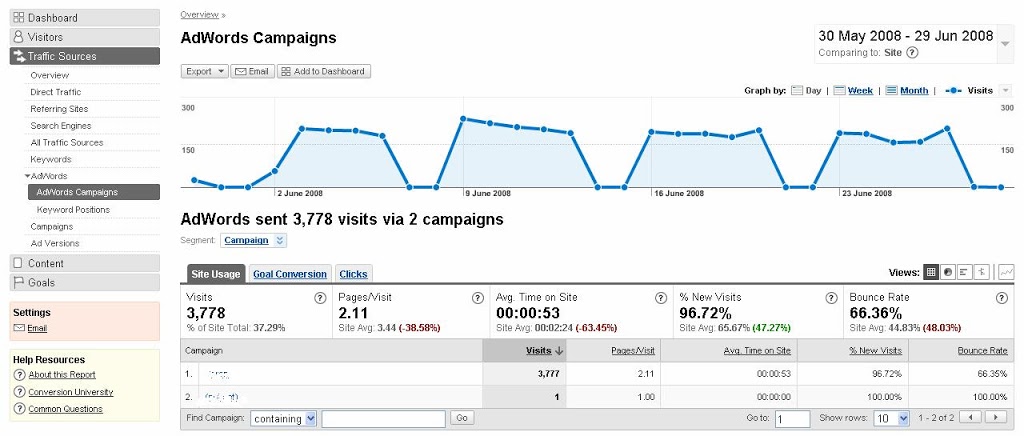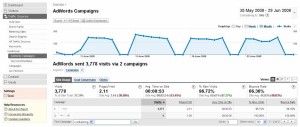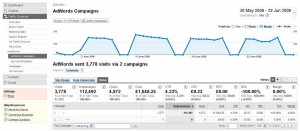How and what to do with your adwords campaigns in Google Analytics

Last time I blogged about how you set up your campaigns in HBX and Google Analytics. Whilst I have given a bit of a description on what to do with your campaigns in HBX before (more on that one later), I thought this time I’d write about Google Analytics. Specifically, having joined up your adwords and analytics accounts, what should you do with the outcome of it. Hopefully out of all of this, you should be able to go and find out that critical information to calculate your Return on Investment. That way you can work out how much more money you can spend before it stops making you more money than you are spending.
How Do I find out how many visits have come from my Adwords?
There it is in the left hand menu, we can see how many visits our campaign has had, along with a few other key metrics. I always think that this maybe shouldn’t be the screen that you get presented with, but you should see the ‘goal conversion’ tab. More of that later though.
The advantage of linking your adwords campaigns to your analytics account is that you can view more metrics here than you could by doing each of them individually. More to the point you have the ability to drill down into your campaigns and look at your adgroups individually. If you have set up your adgroups correctly, you can then focus on each of these individually to optimise your keywords. Having picked your ad group you can delve into the keywords themselves that are driving traffic:
The beauty of this is that you can take each of these keywords and try and optimise individually. You know that you can do exact matches, broad matches and negative matches. Start out with your broad matches so that you have a long tail of keywords. You can then give the keywords that are performing well more money by splitting them out into a new group and giving them an exact match.
Why don’t my visits match my clicks from Adwords?
This is a popular question. These two systems may never match. Fortunately I have given this explanation enough times that I can just copy and paste out of an email:
- Anyone who double clicks on a link will be counted twice by Google Adwords
- Anyone who clicks on a link and can’t connect to the page gets counted by Adwords but not by GA
- Anyone who clicks on a link, connects to a page and the GA tag fails gets counted by Adwords and not by GA
- Anyone who clicks on a link, connects to a page and then clicks on a link on that page before the GA tag has loaded gets counted as a click in Adwords and not by GA
- Anyone who clicks on a link, connects to a page, loads the GA tag, but then gets filtered out of GA because they’ve filtered out internal traffic from their GA account will get counted by Adwords and not by GA
- Anyone who clicks on a link, connects to a page, loads the GA tag, but then gets filtered out of GA because GA thinks that they are not a real person will get counted by Adwords and not by GA (although in theory they’ll get filtered out of Adwords this doesn’t necessarily happen)
- Anyone who clicks on a link, connects to a page, loads the GA tag, but blocks any cookies that GA attempts to give them will get counted by Adwords and not by GA
The funny thing is, with Google Analytics, you can tell. You can find out what the difference is. Click on the tab that says ‘clicks’ and you get your answer:
Again, you can delve down into this. I like the way that it tells you per adgroup, per keyword. You can delve down per keyword to find out which is the most competitive (ie you have a low click through rate – impressions divided by clicks and you have a high cost per click). You should also be able to work out which is the least competitive, which should help you generate the most traffic from those.
How do I work out ROI?
The most important of the tabs is the one that says ‘Goal conversion’. This is the one where you work out if the money you are spending is making you more money than you are spending. The first trick to this is to work out what you want your users to do. On an eCommerce website, this is fairly obvious – you look at your page that says ‘Thank you for buying my product’. You set that up as a goal in Google Analytics. How do you do that? Well follow these simple steps:
- Log into your analytics account
- Click ‘edit’ on the settings column on your website
- Under ‘Conversion Goals and Funnel’ click on the edit to the right of G1
- Type in your conversion page (‘thanks for buying’) into the box ‘Goal URL’
- Type in your goal name (eg ‘Buying product A’) into the ‘Goal Name’ box
- If you know how much it gives you in terms of value, type that in too in the ‘Goal Value’
- Click the ‘Save Changes’ button at the bottom of the page
- Repeat for all conversion points
- View your reports
Now you have your goal set up, each of your reports now shows you all your goals too. This should allow you for your adwords campaigns to do all the things you were doing before, but with real conversion points associated with them.
This gives you the real option of looking at each of your campaigns now in terms of conversion rate as well as clicks, visits, CTR, CPC, etc. If you can see one of your groups isn’t converting at all well, lets look at the keywords in that group and find out which ones aren’t working, so that we can put a negative match in google Adwords. We can take the ones that are converting well, look at the click through rate and cost per click to work out if there is any more scope to increase the volume without compromising the conversion.
More importantly, the search functionality will allow us to group our broad match keywords together and get a nice sum at the top. We don’t want to take all of those single click and single visit terms on their own, but being able to search our broad match will give us more knowledge of what is going on with it and whether it is converting.




Hi Alec;
The discrepancy between GA and Adwords reporting is something that keeps causing confusion. If you have an e-commerce site, you should add to the list the fact that GA gives credit the last referrer for a conversion. So, in a multi-visit scenario, whereby the visitor first came in on an Adwords ad, but then for example via an organic search, GA would give credit to the organic search as opposed to Adwords.
Web analytics data is messy…
Good point Michael. We haven’t really ever looked at how you attribute a series of campaigns to cause a conversion. Google Analytics (and most other web analytics packages) will attribute to the most recent campaign. If you use a campaign manager though (eg Adwords) then they tend to claim it even if they weren’t the last one.